In a network of lines that enlace
Gripping
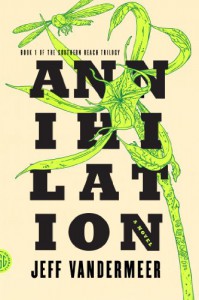
Another of my I-can’t-walk-passed-Foyles-without-buying-a-book purchases.
This was a pleasant surprise, mostly because I wasn’t expecting anything. I hadn’t heard of this series, and had only scanned the blurb when I bought it. Which turned out to be a winning combination, because this novel is additive. I just couldn’t put it down, and I wanted to be left alone so I could continue reading.
It’s written from a journal of an unreliable narrator only known as ‘The Biologist.’ The author informs you from the start through the twisting plot and strange circumstances that this account will be flawed, and the more that’s revealed, the more so it becomes.
A group of 4 women travel to ‘Area X’ on an unknown mission, documenting what they see and feel. The Biologist tries to stay objective and aloof, yet as she does so reveals much of her past and reasoning for being in this contaminated place, drawing you more and more towards her.
The strangeness and creepy nature of Area X is well written, and I constantly tried to guess what had happened before, and what was happening now. I raced through the novel, and had to buy the second in the series just before I finished it, so it’s definitely a high ranking tale.
I was a little disappointed by the ‘big reveal’ section of The Crawler, more because I feel that uncanny nature of what isn’t seen was the power in this novel. But the plot and writing were good enough to make this flaw passable. I look forward to the second one.
A mystery worth revealing

J.K Rowling isn’t an author I’d say I adore. I did, like most people my age, adore Harry Potter growing up, and the novels did play a large part in my childhood. Appropriately, The Deathly Hallows was published the summer before I left for university; so while I do have a place in my heart for Rowling’s writing, I would never add her to my top ten list.
I also deeply disliked The Casual Vacancy, so hadn’t considered trying Cuckoo’s Calling, until two people I trust recommended it to me. Combined with seeing it on sale for £2.50, I decided to give it a go. And it’s more than worth it.
Characters are her forte. Everyone in this novel is incredibly well-rounded and visual. You don’t necessarily like anyone in this story; Strike being too brash yet easily manipulated, Robin too stuck in her routines and overly excitable. But they are human, and I found myself connecting to their story because their actions seemed plausible.
The story is intriguing, and grips you from the start. I wanted to know what happened to Lula, and the reveal was well done. I only guessed who her killer was just before the end, and even then I couldn’t tell you exactly how it was done. She’s an excellent crime writer, it must be said.
The second in this series will soon be bought!
A clever collection

This is a collection of short stories; all unique and without connection. They are science fiction, and general fiction, set in the future, alternate realities and the past. What I enjoyed was the variety and the sheer depth of these pieces. Many are complex; about mathematics and language, going into very specific and interesting detail. Others, like ‘Understanding’ follow complex characters and bring you into their minds. I liked all of them, although ‘Understanding’ appealed to my superhero interests, ‘Story of Your Life’ was perfectly bittersweet, and ‘Hell is the absence of god’ was dark in a way that I enjoyed. Some stories were a little overly complex, and I found myself skipping sections. However, overall, very pleased with this collection.
A wonderful introduction
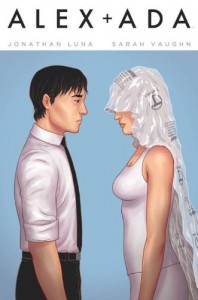
Set in a futuristic world, Alex receives a rather unwanted present from his grandmother; the most sophisticated android on the market. In the midst of recovering from a breakup, Alex receives Ada; life like in all aspects but void of a personality whatsoever. She responds to orders and doesn’t sleep, mimicking a person in a way that Alex finds both off-putting and sad.
Behind the scenes of this is the mention of a massacre committed by the first sentient android. Since then, no android on the market is self-aware; and there is constant fear by the public of another incident. Despite this, Alex is confused by Ada; and doesn’t feel its right to let her be as she is. Through investigation, Alex enables Ada to unlock her sentient self and gives her freedom of her mind.
It’s a great first comic; a lot packed into the first volume. I loved how much detail they manage to convey about Alex, his situation and his confusion about the place his find himself in. The storyline is intriguing, although not that original. The art is brilliant; I especially liked the scenes in the internet/forums.
I’ve already bought the next one, and can’t wait to read.
Good plot, but not my type of story

I am torn about this novel. I liked the idea behind it; the folklore plot is always a favourite of mine. This is a dark twist on the often overdone plot line. There’s a lot of the violence and nasty side of the fae, which is often glanced over in well-known stories. I don’t think there are actually any fairy folk in the novel who have nice sides. Most are evil, or will bring humans to a sticky end; whether they mean to or not. I liked this nod to the traditional folklore.
I also liked how the children were represented. Both Ewan and Colby were taken, in one way or another, from their normal childhood and brought to the fairy realm. Both suffer greatly as adults. Instead of the story ending with them returning happy or enlightened, both are cursed and haunted by their experiences. It felt real, and I liked that.
What I hated, was how the novel tried after a while to become a morality tale. Thinly veiled religious teachings are suddenly flung upon you as you’re immersed in the story.
Personally, that’s not what I like and some of doctrine I actually disagree with strongly on a personal level. Which therefore pretty much ruined my enjoyment of the story.
I think if you like that aspect, can ignore it or aren’t bothered by it, this is definitely worth reading. But I won’t be picking up the next in the series, which is a shame.
A powerful subject, but an easy read
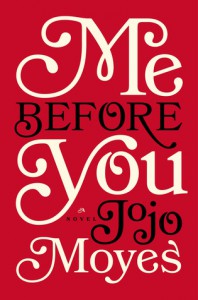
Another novel that once again proves to me I do like Young Adult fiction; as long as it’s not by an American author.
In the height of the recession, Louise Clark loses her job. Being surrounded by a dependant family and a drive to do something, she takes a job as a carer for Will; who two years ago was hit by a motorbike and is now a quadriplegic. As the novel moves on, it emerges that Will cannot stand living as he does, and plans to end his life through Dignitas.
This novel is set around the time where Right To Die was heavily debated in the UK; and cites a particularly famous case that I remember discuss in depth myself at the time. It’s a difficult issue, and one the author sets out well. I think that’s one of the reasons this book is so good. The characters are very real; mostly because they are all flawed. They are selfish and wrapped up in themselves, limited by their own experiences. They are truly people. I particularly disliked Louise’s family; but that actually helped me get into the novel, as it just made it more real for me.
The author does occasionally switch perspective to other characters randomly during the novel. I really didn’t like this, and think it’s the only glaring flaw in the novel. It’s nonsensical in how it’s done, and it holds up the pacing of the novel while you adjust to what’s happened. In general, it adds nothing by having those alternative few perspectives either.
This is easy reading too, so a good one if you’re looking for something not too heavy, but with a powerful message. A good read.
Confusion in words

Write what you know. It’s always the ‘advice’ others give us. Whether you believe it or not, it seems to be a staple of what people recommend you do when approaching creative writing, no matter how knowledgeable they may or may not be.
Marina wrote what she knew, and what she lived. Which, as a woman in her early twenties about to graduate, was confusion. She voices the adolescent mind working its way through everything it encounters like no other. I remember feeling precisely what she describes, and she’s captured it so perfectly. The Opposite of Loneliness is a fabulous essay, a moment and emotion in time caught perfectly. She had much talent, and I am sure would have gone on to do many things. The repeated line ‘we are so young’ makes the piece that much more evocative in light of her death.
Much of her writing is very similar in the prose sections. I much preferred her essays and the snippets of poetry. She is repeating sentiments and feeling, much as she was probably experiencing in her own mind. Much as you do when you’re a teen. That was her perspective on life, and it’s very well done.
This is a good collection, worth reading for the power of raw talent so sadly lost that radiates throughout.
A New Favourite

I don’t know how I got to this age without reading To Kill a Mockingbird. It was probably due to how renowned it is; I tend to shy away when something is so iconic. It’s often a let-down.
This novel proves I need to kick that mindset to the curb. I was hooked from the instant I started reading. Lee gets us into Scout’s mind so perfectly, and actually the perspective of someone so young on such a pivotal moment is truly intriguing. It does take a while to get to the real theme of the novel, but I actually didn’t mind that. I was so invested in Scout that I was happy to follow where her mind and life took her.
It’s sometimes hard to remember how life was and how people were to one another due to skin colour. It’s terrifying to think it wasn’t so long ago; and equally terrifying that we still haven’t come far enough. It’s definitely something everyone should read, cherish and understand. I am sad I didn’t get to it sooner, but incredibly glad I have read it.
Thoroughly recommend.
Conspiracy humour

This is not usually my type of book. If I’m brutally honest, I couldn’t care less about dramatic military fiction. I tune out of the plot lines, hate the cliché characters and these government conspiracy theories are dime a dozen.
So why did I actually finish it?
The writing, for starters. It’s paced very well, with a strong voice from the protagonist. He’s a mixed up, annoying and sometimes patriarchal idiot; there is a particularly bad scene in which he declares he can’t have feelings for a woman who isn’t one he can rescue. I contemplated giving up at that point. However, the brutal honesty makes it more real, and apart from that scene, I generally enjoyed being in Thomas’ mind.
Of course, one of the main joys is the humour. I’m biased, I know, but not much compares to intelligent British humour. It’s not seen often in literature, so it’s wonderful to experience it through writing rather than as part of a comedy act. Hugh Laurie translates his comedy very well into writing, and I do think that’s one of the reasons I didn’t give up completely.
The plotline is your basic military conspiracy; it’s James Bond, if 007 was more reluctant, broke and a bit of an idiot. Thomas doesn’t quite meet anti-hero for me. He’s not even a hero in my eyes. He’s the guy that steps up, because no one else can; and he’ll save the day…eventually. In a very long winded, confused and dramatic fashion he will get there in the end.
This novel is probably more appealing if you like Bond, action in general or conspiracy stories. But for the joy of the humour and witty writing, it’s worth a go.
I’ve been really bad at reviewing books lately…well, for a while now so time to get back into it! More posts to come soon.
Pure fantasy

Pure, undiluted brilliant fantasy. This novel is truly fantasy at its best, from a deservedly renowned science fiction and fantasy writer. The pace is fantastic, and the writing gripping. Pretty sure I missed my stop on the tube due to reading. Corwin’s amnesia is written well, and his slow awakening is enough to make you interested in the unfolding plot without being bored. It’s brutal yet beautiful, and the magic system of the world is well done.
The book is out of print, which is a shame when it’s so wonderfully written. The series is available second hand though, and I shall be getting the next one.
Strange and outdated

Ritual is the novel it’s thought Wicker Man is based on. I was expecting therefore a creepy exploration into an isolated society with ancient beliefs.
What I got was a strange novel. The writing and protagonist jump around from one part to the next; leaving the reader behind as they go. The confusion between what is real and what is perception is so strong that it just leaves you feeling uncomfortable and baffled. The ending is, quite frankly, awful. The protagonist has schizophrenia, and is really the killer. Putting aside the terrible writing, this is offensive and extremely outdated thinking.
All in all, rather disappointing.
Memorable easy reading

I enjoyed The help, and I think it will be a book that stays with me. Not due to it being fantastically written, or earth shattering but because of it's easy-reading nature and the mark it leaves on you.
It isn't a hard going book. You can race through it or pick it up and put it down with ease. It's a good book if you want something meaningful but not overly complex. The storyline is good, and the messages hard-hitting. It's easy to forget how different the world was not too long ago.
The characters are lacking in dimension. They are almost caricatures of what they represent, and that is what prevents this book from going any further. That's where it's most disappointing, but at times that's what you need from a book.
It's well worth a read.
A child's introduction to fantasy and science fiction
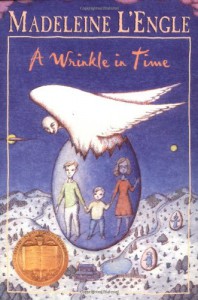
I enjoyed this novel, although it’s most certainly not aimed at me as a reader. It’s a sweet story that first introduces the concepts of science fiction and fantasy novels to younger readers. If I’d read this earlier in my life, I think I would have greatly appreciated it.
It does contain some very predictable and for me somewhat dull undertones. But again I’d probably put that down to not being the intended audience of the novel. Some parts of it actually were quite creepy, and the writing is nicely visual.
A great story for children, but not one that I think translates as well for adults
Darkly absorbing
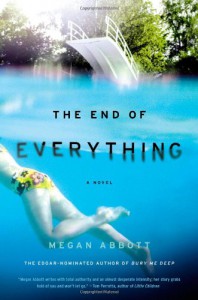
There’s something about Meg Abbot’s writing that’s all consuming. I read this book very quickly; her language is accessible and she drags you right into the minds of her characters and throws you into their world. Whether or not you want to be in it.
I’m definitely sure I don’t want to be in Lizzie and Evie’s world. The story is told through Lizzie, looking back at the time when her best friend went missing. It’s a confusion of back-and-forth memory, of times with Evie and her family and the events that led up to her friend’s disappearance.
The dark undertones of the novel are subtly terrifying. The novel in many ways is a twisted bildungsroman for both Evie and Lizzie on the cusp of puberty, and the perfect Dusty who approaches eighteen. It looks into the fine line between male adults caring for these young people, and when that line is crossed. It’s terrifying, and awful at times, and I found myself cringing away as the novel develops.
It is a good novel, but the disturbing subject matter may not be for everyone.
Apocalypse humour
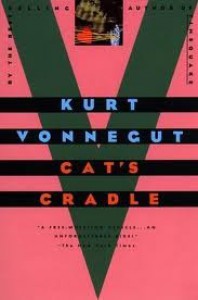
The end of the world is approaching, and there’s very little we can do. Our destinies are written out before us, and all we can do is follow. That’s at least how it is in Cat’s Cradle. The novel is a witty, darkly humorous take on the apocalyptic literature that emerged during the Cold War. This begins, just like many of these with the creation of nuclear warfare, but ends in a rather different fashion. It’s far more fantastical, but questions our thoughts on humanity, governing philosophy and the nature of religion.
I could barely put this down, and raced through it in a few days. It switches so naturally from a dystopian post-war piece into science fiction and fantasy that it all doesn’t seem so entirely fantastical until you take a step back from it. Highly recommended.
The science of science fiction

I’m not sure how I feel about Triton. There were parts I couldn’t get enough off, reading obsessively and loosing track of time. And others I just plain skipped. There’s a lot of sci-fi science explained in great detail, which began as interesting but quickly became arrogant and unnecessary. Also the main ‘plot’ of the novel wasn’t clear at all; whether this was a comment of society, on gender or an exploration into one person’s psyche. It didn’t seem to mesh at all. The political and gender discussions of the novel were very interesting, and well done. They just didn’t seem to connect to anything. It’s a novel I’m glad I’ve read, but not one I’d try again
 3
3

 2
2









